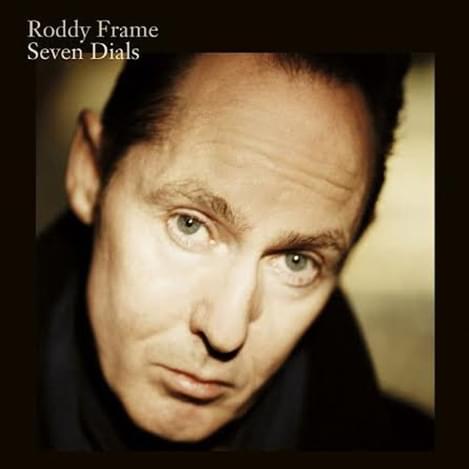Roddy Frame - Seven Dials
"Seven Dials"

In the years since his retirement of the Camera name, Frame has shown more consistency as a songwriter and, despite not releasing a studio album since 2006, has kept his cult status afloat via live recordings and occasional but instantly legendary concerts.
On his fourth solo album, Frame is concerned primarily with change; it’s all travel, transition, movement and departure. While, as ever with Frame, these are primarily love songs, here we’re dealing with the aftermath rather than the event, the approach rather than the destination. It’s a wonderfully understated record for the most part and at times approaches the restrained, heart-tugging perfection of his eighties peaks. In fact this collection seems to touch on all of Frame’s stylistic high points.
Those on the lookout for shimmering pop will not be disappointed in the likes of “Postcard” – an exotic shuffle with a kissable blue eyed soul chorus and an ascending guitar line striking in its simplicity, perfect in its economy. “Send me a postcard/From hazy California signed with love”; Frame rolls the luxurious words around his mouth, half-drunk on sunshine before asking, grinning “Shoo-be-do-a? Or Shoo-be-do-b?” (it works better when he does it).
In the same vein lies the sunning single “Forty Days Of Rain” (how bleak a title is that, on reflection?) with its redemptive refrain and, again, perfectly pitched lyrics like “I kneel and feel the frost on the ground/And I rise and I pray”. It harks back to one of his best singles “Reason For Living” and similarly performs a neat balancing act between boldness and outright bluster.
“Bury me at Seven Dials/So my soul can never find it’s way back to where I kissed you” begs Frame on another downbeat in theme, upbeat in delivery tune “Into the Sun”. The use of Seven Dials lyrically and as an album title is a snug glove fit here – so many roads to choose from a single central point, no idea which to take. In fact the album could be perceived as Frame’s version of a choose your own adventure book – projecting possibilities onto the paths he could have taken from one single moment. Regardless of hypothesis, it’s a shining slice of pop grace.
Frame’s voice is rich here, tinted with resignation, loss and the occasional curtain crack of hope as on “Rear View Mirror”. This is where the album first drops down a gear and nestles into “Surf”-like minimalism. All brushes and soft-stroke strums, Frame laments that he’d “..rather wake up with my dreams at sea/Than drown inside somebody’s dream of me”. It’s a simple, sad groove that rubs elbows with perfection, all the while staying true to that focus on movement: “I’m looking in the rear view mirror doing a hundred miles an hour/Thinking we could be together”.
Staying with the low key we have “English Garden” with its cool as fuck opening lines “I was on the corner on borrowed time/Waiting for the ghosts inside me to be exercised”, Frame’s voice straight from the gut but hesitant, half mumbled. The instrumentation is sparse but effective – the stark solo sounding like it’s crying alongside the heartbreak of our protagonist. Frame sums up stoically “The past is like another place/it’s a foreign land”.
Certainly there are minor mis-steps; opener “White Pony” deals largely in cliché and catches Frame out, not for the only time, talking like a ‘50s teenager (“Knockin’ around and talkin’ about the weekend”), but it does boast one of those delicious Frame lyrical inversions (“the quicksand to the stars”) and a quirky lurch into David Bowie torch song. “The Other Side” baffles somewhat – certainly a heartfelt ballad but again drenched in cliché and balanced precariously on an Noel Gallagher chord progression (indeed the overblown guitar solo here reeks of Be Here Now). Obvious is just not what Frame does best.
The very best thing here, closer “From A Train” sounds, initially, like a Richard Buckner song – spidery, haunting acoustic guitar lines and quietly delivered, melancholic words: “I knew our star would take a dive/Not something you would wish…upon” shares the higher ground of lyricism with the desperate “Everything great comes apart at the seams”, the white light hope of “Some days it’s so beautiful you feel joy and cry” and the final, glorious kiss-off couplet “From a train here’s the view/Love is pain rushing through/Just when you thought you’d arrived”.
While Frame has sometimes been accused of remaining an observer in his own songs, at one remove from emotion, it feels like here things are different. While never far from a quip or a Bob Dylan-like trick this appears to be a summation from Frame, and a very personal one at that. That Seven Dials is always on the move, though, doesn’t hint at finality, more at the further possibility of great things to come. This, for any lover of the cracked ballad, the pop hit, the smart word or the perfectly chosen chord, is essential.
Get the Best Fit take on the week in music direct to your inbox every Friday

Tunde Adebimpe
Thee Black Boltz

Julien Baker & TORRES
Send A Prayer My Way

Bon Iver
SABLE, fABLE





